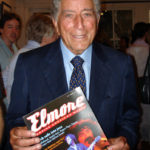 Iconic bassist, guitarist, singer, songwriter Tommy Stinson personifies all the danger and excitement of rock and roll. Joining the legendary group The Replacements at age 11, he literally grew up with the band. When the “Mats” broke up, Stinson took over Duff McKagan’s role as bassist with Guns & Roses for 17 years.
Iconic bassist, guitarist, singer, songwriter Tommy Stinson personifies all the danger and excitement of rock and roll. Joining the legendary group The Replacements at age 11, he literally grew up with the band. When the “Mats” broke up, Stinson took over Duff McKagan’s role as bassist with Guns & Roses for 17 years.
Stinson has worked with many of the biggest names in rock and roll including Paul Westerberg, Dave Pirner/Soul Asylum, Tom Waits, and has toured with Elvis Costello, R.E.M., Tom Petty, and many more. He has maintained an active solo career with groups including Bash and Pop, Perfect, One Man Mutiny, and is currently on tour as one half of the duo Cowboys In The Campfire.
I found Stinson to be funny, personable, and highly passionate about politics. I spoke to him by phone as he crossed through the mountains of Idaho into Washington State.
Elmore Magazine: While performing live on KEXP earlier this year, you stopped the song in the middle and started again, which was perfect given that the title was “Anything Can Happen.”
Tommy Stinson: Yeah, there are times when you start a song, and it’s not quite right. For me, if I’m not quite doing it right in the first couple of notes, I’ll start it over. I don’t care. I can do what I want.
EM: I first saw you with the Replacements opening for Tom Petty in the late 80’s. It was a wild, raucous set, and seemed like it could fall apart at any moment, which made it really exciting. It seems like you still keep that spirit alive.
TS: Well, yes and no. I like the emotion of music and what it does. Obviously I’ve never been a faker. I was in Guns & Roses for 17 years, and that pretty much ran on emotion as well. I’ve always gravitated to the emotional side of music, as opposed to some of my peers. When we were opening for R.E.M in the 80’s they always sounded the same every night. I remember thinking that it was special that we didn’t and that we had some kind of different spark, albeit sometimes self-deprecating and self-defeating. I liked it more. We never could’ve played the same set twice like those guys. (Laughs) They had that show business thing down, but we never really subscribed to that.
EM: That’s interesting you mention R.E.M. I recently watched an interview with Bob Mehr, author of Trouble Boys – The True Story of The Replacements, and he compares the Replacements and R.E.M., basically saying that there was a moment when both groups were vying for the position of #1 band in the independent music scene. However, the two groups would go in very different directions. What’s your take on that?
TS: I’ll be honest, I haven’t read the book, but you know, definitely two different schools of thinking. Those guys knew how to play the game within the industry to further themselves along. I think the Replacements couldn’t play the game because we found it repugnant, and it served us well in one way and not in others. It kept us honest but out of the spotlight. Laughs.
EM: I know that The Replacements reunion show at Forest Hills Stadium in Queens, NY a few years ago was received so well. Do you think the fact that the band stuck to its guns and maintained its integrity helped cultivate such a loyal fan base that has only grown over the years?
TS: Yeah. We did the reunion and showed up with what we had in our arsenal, and having spent so many years doing so many good gigs and bad gigs over the years, we just got right to it rather than making it stink.
EM: Going back, did you grow up in a musical household?
TS: Not really. My brother turned me onto music, and my sister Lonnie turned me onto funk music after that. The only player in our family was my uncle Tom who used to jam with Dick Dale in the army, but I didn’t learn that until I was 35! Bobby caught me messing around on bass, he was already playing guitar, and then he kind of bribed me. Laughs. He was looking out for me at a certain point.
EM: What was it like joining the Replacements at age 11?
TS: It was nutty. If you can imagine playing kegger parties at that age. I didn’t drink then, but it sure was neat to have girls interested in you at that age. The Minneapolis music scene was a great musical community then. We had a bunch of bands that all played and hung out together, like Husker Du. There was a good, healthy competition. I’ve lived in L.A., New York, and other places, but I’ve never seen anything quite like it anywhere else. It was quite special.
EM: How is Chris Mars different from other drummers?
TS: It’s funny you ask me that because he just sent me his new record the other day, which was very cool of him, and I’m dying to listen to it. Stylistically he had a very different approach to drums. He was as different as they get, as different as Keith Moon was to John Bonham. He was interesting and such a big part of what our sound was. He was a very unconventional drummer in a good way.
EM: I understand that Bob had a troubled childhood, including sexual abuse, which is sad to learn. But he seemed to turn the negative into a positive with his humor and his guitar playing. How do you remember him today?
TS: I remember him exactly in that way. He was a funny, fucking guy, and he had a beautiful heart. He was the sweetest guy on the planet that you could meet, and super goofy. He could also have an angry streak in him if you pushed him in the wrong way, but when he died I only had the good things to remember him by, and that was the beauty of that. That was sort of the gift I suppose.
EM: And then came Slim (Dunlap).
TS: He brought a completely different style of guitar playing for one. He was not nearly as wild as Bob. He brought stability which was needed at that point because we had been going off the rails with Bob, but Paul had been writing tunes that were a bit more serious, with different instrumentation in open tunings for example. It worked out in some ways and not in others.
EM: When you look back at all your records, what are the highlights?
TS: I think that Friday Night Is Killing Me is a standout moment because of what it represents to me and everything I’ve done since or before. It was my best effort coming out of the gate after the Replacements. It was well received by guitar players and critics. It opened up the door for me and gave me the confidence for what I wanted to do.
EM: You’ve worked with some great producers like Peter Buck of R.E.M., Tommy Ramone, and Jim Dickinson. Who were your favorite to work with?
TS: I think of all those, I liked working with Jim best. He was funny and cantankerous but knew how to get stuff done.
EM: What can you tell me about working with Guns & Roses? How did you get that gig?
TS: My buddy Josh Freese was playing in the band. It was sort of a lark that I even went and auditioned. But it was a great run for me, a great 17 years of my life that I put into that. I’m thankful for it. I know all those guys and am friends with them. Duff and I met about halfway through and we discovered that we had a lot in common, for example his band opened for the Replacements back in the day. It was a great experience for me and I have nothing but good things to say about it. Axl Rose is pretty solid as a guy. If you’re on his good side, he’s got your back. We had our ups and downs, but ultimately my experience with him was great.
EM: Your tours allow you to see a lot of the country. What’s your take on the state of the nation today politically and otherwise?
TS: I keep in touch with a couple of my buddies who work in Washington, D.C. We have a few people we call to find out the real deal and tamp down what’s going on. But ultimately this fucking moron is going to run our country into the toilet. Hopefully, they’ll pull back some of his power. You can’t just let a guy run amok and run the country into the ground. Things like allowing the hunting of elephants…it has nothing to do with anything. He’s doing anything he can just out of spite for Barack Obama. What did Obama ever do to him? It seems completely moronic and high school.
I have to call my friends in D.C. every day; they give me the inside scoop. It’s unprecedented and unworldly. Without running a complete rant, it is nuts. I think if we are patient and watch what’s going on, we might be called to arms and have to go to D.C. and protest this fucking ding-dong that’s our President. I think that will happen once he starts offending his base, and I think without a doubt that will happen. It’s inevitable. At some point he’s going to turn his own base against him because he’s just psychotic. I kind of wonder if Alzheimer is setting in with him? Is he slipping in some ways that they’re just not talking about? From what I hear from my friends in D.C., I feel that they’re pulling some of the tools out of his hands so that he can’t just snap and drop a nuclear bomb. That’s the most troubling thought there is. There’s something very troubling to be assessed about his mental health. You can see it in the things he writes, tweets, and says. Sadly, we have half a country that’s full of morons that don’t understand or see what this is about or see the danger in it. But it’s a democracy, y’know?
EM: I think of your music as appealing to more enlightened fans, but there must be moments in your travels when you play to more conservative crowds. Do you ever pick up on the division in the USA right now?
TS: No, but I’ll be honest with you, I’ll get into politics with anyone. And you’re right, we do tend to have more enlightened audiences. I have Republican friends, but they’re not insane and didn’t vote for Trump. They just have conservative values. I believe there’s a reason we have a Democratic and a Republican party. Intrinsically it makes sense to have checks and balances on each other, but that when you go too far one way or the other, that’s when you have problems. Things are bananas now, but hopefully there’ll be a reset.
EM: In music and in politics there seems to be a disconnect with reality. People have lost a connection with tangible formats such as vinyl in favor of mp3s and Trump is the Twitter president for example. Do you think there’s any correlation?
TS: Oh fucking completely, completely!
At this point in the interview, I lost Tommy Stinson due to poor cell phone coverage. He’s out there somewhere, making waves.
—Michael Cobb







Be the first to comment!